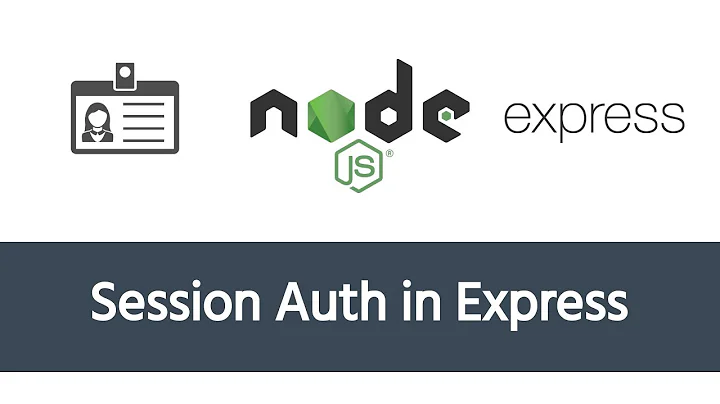What does passport.session() middleware do?
Solution 1
passport.session() acts as a middleware to alter the req object and change the 'user' value that is currently the session id (from the client cookie) into the true deserialized user object.
Whilst the other answers make some good points I thought that some more specific detail could be provided.
app.use(passport.session());
is equivalent to
app.use(passport.authenticate('session'));
Where 'session' refers to the following strategy that is bundled with passportJS.
Here's a link to the file: https://github.com/jaredhanson/passport/blob/master/lib/strategies/session.js
And a permalink pointing to the following lines at the time of this writing:
var property = req._passport.instance._userProperty || 'user';
req[property] = user;
Where it essentially acts as a middleware and alters the value of the 'user' property in the req object to contain the deserialized identity of the user. To allow this to work correctly you must include serializeUser and deserializeUser functions in your custom code.
passport.serializeUser(function (user, done) {
done(null, user.id);
});
passport.deserializeUser(function (user, done) {
//If using Mongoose with MongoDB; if other you will need JS specific to that schema.
User.findById(user.id, function (err, user) {
done(err, user);
});
});
This will find the correct user from the database and pass it as a closure variable into the callback done(err,user); so the above code in the passport.session() can replace the 'user' value in the req object and pass on to the next middleware in the pile.
Solution 2
From the documentation
In a Connect or Express-based application, passport.initialize() middleware is required to initialize Passport. If your application uses persistent login sessions, passport.session() middleware must also be used.
and
Sessions
In a typical web application, the credentials used to authenticate a user will only be transmitted during the login request. If authentication succeeds, a session will be established and maintained via a cookie set in the user's browser.
Each subsequent request will not contain credentials, but rather the unique cookie that identifies the session. In order to support login sessions, Passport will serialize and deserialize user instances to and from the session.
and
Note that enabling session support is entirely optional, though it is recommended for most applications. If enabled, be sure to use express.session() before passport.session() to ensure that the login session is restored in the correct order.
Solution 3
It simply authenticates the session (which is populated by express.session()). It is equivalent to:
passport.authenticate('session');
as can be seen in the code here:
https://github.com/jaredhanson/passport/blob/42ff63c/lib/authenticator.js#L233
Solution 4
While you will be using PassportJs for validating the user as part of your login URL, you still need some mechanism to store this user information in the session and retrieve it with every subsequent request (i.e. serialize/deserialize the user).
So in effect, you are authenticating the user with every request, even though this authentication needn't look up a database or oauth as in the login response. So passport will treat session authentication also as yet another authentication strategy.
And to use this strategy - which is named session, just use a simple shortcut - app.use(passport.session()). Also note that this particular strategy will want you to implement serialize and deserialize functions for obvious reasons.
Related videos on Youtube
Georges Krinker
Updated on August 10, 2021Comments
-
Georges Krinker over 2 years
I am building an authentication system using Passport.js using Easy Node Authentication: Setup and Local tutorial.
I am confused about what
passport.session()does.After playing around with the different middleware I came to understand that
express.session()is what sends a session ID over cookies to the client, but I'm confused about whatpassport.session()does and why it is required in addition toexpress.session().Here is how I set up my application:
// Server.js configures the application and sets up the webserver
//importing our modules var express = require('express'); var app = express(); var port = process.env.PORT || 8080; var mongoose = require('mongoose'); var passport = require('passport'); var flash = require('connect-flash'); var configDB = require('./config/database.js'); //Configuration of Databse and App mongoose.connect(configDB.url); //connect to our database require('./config/passport')(passport); //pass passport for configuration app.configure(function() { //set up our express application app.use(express.logger('dev')); //log every request to the console app.use(express.cookieParser()); //read cookies (needed for auth) app.use(express.bodyParser()); //get info from html forms app.set('view engine', 'ejs'); //set up ejs for templating //configuration for passport app.use(express.session({ secret: 'olhosvermelhoseasenhaclassica', maxAge:null })); //session secret app.use(passport.initialize()); app.use(passport.session()); //persistent login session app.use(flash()); //use connect-flash for flash messages stored in session }); //Set up routes require('./app/routes.js')(app, passport); //launch app.listen(port); console.log("Server listening on port" + port); -
Georges Krinker about 10 yearsThank you for your quick reply but that does not answer my question. Also, note that if you have an express application and use express.session(), on any client that connects to your express server (whether he is authenticated or not), he will be given a session via a cookie. That is independent on whether he is in a login protected page of your app or not. I still would like to know the difference between both middleware.
-
Josh C. about 10 years@GeorgesKrinker it's the serializeUser() and deserializeUser methods. The express middleware will restore the session info, but that's not necessarily related to how passport is managing the user info. That has to be done after the session is rehydrated by express.
-
Georges Krinker about 10 yearsWell I was under the impression that the serializeUser() and deserializeUser methods ran on authenticate() within the routes.
-
Josh C. about 10 years@GeorgesKrinker I don't think so. When I used passport, I only called .authenticate on login.
-
Josh C. about 10 years
app.post('/login', passport.authenticate('local'), ... -
Georges Krinker about 10 yearsWhat do you mean? It's run on every request and doesn't necessarily have any credentials to authenticate. Would you mind giving me a little bit more details on the workflow that happens on each request?
-
Jared Hanson about 10 yearsYes, its run on every request. The session ID that is generated by Express, is a unique ID which is roughly equivalent to an authentication token that the browser sends with every request. The data stored in this session is used to restore the authentication state of the user.
-
Saras Arya over 8 yearsHello @JaredHanson Could you take a look at this. I couldn't find the answer anywhere?
-
DollarCoffee almost 8 years@JaredHanson I am trying to use passport.js to authenticate with a widely used open source authorization server which is OAuth2 compliant. But I am getting an error. Are you willing to help resolve the problem? Here is the link: stackoverflow.com/questions/38176236/…
-
Newbiee over 7 yearshey, how can i store user details in session only i dont want to store them in database dirctly
-
 caub over 7 years"in the request headers" ? no just in the request object
caub over 7 years"in the request headers" ? no just in the request object -
user1102171 over 7 years@JaredHanson: What I observe is that the req object augmented with passport.user info just after login via google-oauth, is lost when the next request for a new page is done on the site. Is this expected behaviour ? Then I am at a loss of how to get back the recently logged in user info ?
-
nishant over 5 yearsI have noticed that if the session strategy is able to restore the auth and deserialize the user. But despite that the authentication still moves to the next strategy, which is facebook auth in my scenario. I wonder what is the point of session strategy if it still continues to invoke the following strategies even when the session is able to recover the user.









